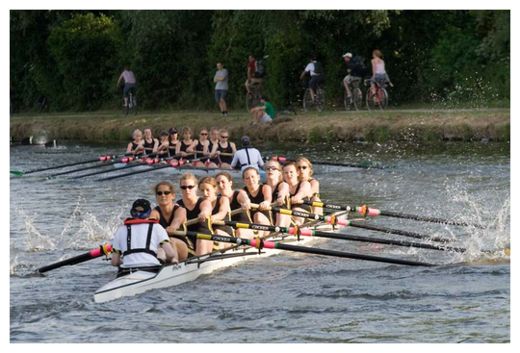
For the new work, researchers stayed away from foxholes. Instead, they focused on another stressful - yet significantly less dire - activity: competitive rowing. The scientists recruited 100 rowers mostly in their 20s who lacked strong religious commitments, as determined by a questionnaire.
The scientists broke the athletes into two groups. One was about to race in a regatta; the other was preparing for a less stressful training session. Both groups were asked whether they agreed with statements such as: "We can only rationally believe in what is scientifically provable," "All the tasks human beings face are soluble by science," and "The scientific method is the only reliable path to knowledge."
Not surprisingly, the athletes who were getting ready to compete reported higher anxiety levels. They were also about 15% more likely to express a strong belief in science than their less stressed colleagues, a statistically significant difference.
In a second experiment, the researchers recruited staff members and students at two large universities in the United Kingdom who also had weak religious beliefs. They asked some to write about their own death and others to write about the experience of dental pain. Subjects who contemplated their mortality showed about 15% stronger belief in science, as measured by a questionnaire similar to that used in the previous experiment, than those who had written about the less traumatic subject of dental pain, the team reports online this week in the Journal of Experimental Social Psychology.
Belief in science and belief in religion have quite different bases, according to the researchers. Science is defined by analytical thinking, rational inquiry, and an objective weighing of evidence. Religious faith, on the other hand, is founded on intuition, inner experience, and a valuing of historical revelation. Nevertheless, both kinds of belief help people to make sense of the world - and also to feel more comfortable in it, the authors say.
"In stressful situations people are likely to turn to whatever worldviews and beliefs are most meaningful to them," says study co-author, Anna-Kaisa Newheiser, a psychologist at Yale University. And many people find the scientific worldview more compatible with their own. That belief in science fulfills some of the same emotional needs as religious faith is not to equate the two, the researchers say. "That modern secular individuals are prone to cling on to beliefs about science, in the same way that their ancestors turned to the gods," they write in their paper, "carries no judgment on the value of science as a method but simply highlights the human motivation to believe."
Bastiaan Rutjens, a psychologist at the University of Amsterdam, praises the work as a significant advance. But Rutjens, who just published his own study showing that people find comfort in science, says, "Future research should focus on the way in which belief in science can actually help people relieve the negative state commonly associated with threat." Those threats can range from anxiety over a boat race to fear of mortality. Rutjens believes that science, like religion, can help its adherents find balance in an uncertain world.



If really science is helping people, then pray tell why things are getting worse and worse everyday????
I wish I were on Earth before the present over exploitative scientific inventions that has made life so complex, meaningless and loveless. Back in earlier centuries people mostly worked on farms for 4-5 months a year and took the rest of the year off attending to friends and family in the lap of pristine nature.